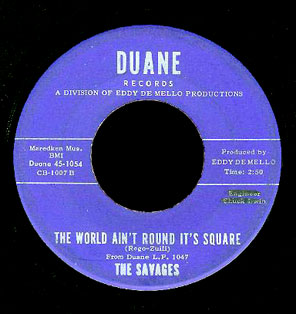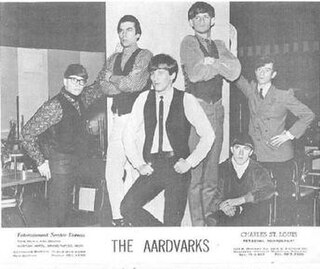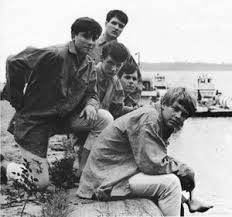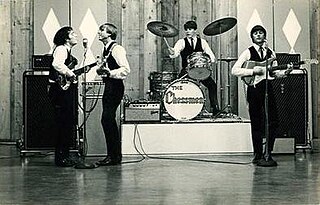
Evil was a garage rock band from Miami, Florida, active between late 1965 and early 1967. They were known for a hard–driving, sometimes, thrashing 60s punk sound that combined elements of blues, rockabilly, and British invasion influences. They recorded several songs, amongst which “Always Runnin' Around” and “Whatcha Gonna Do” were released as a single on Living Legend Records in 1966. The band would eventually be signed to Capitol Records, but broke up shortly thereafter. In more recent years they have become particularly noted for several previously unreleased songs recorded in 1966, which have been released in recent years on various independent labels from acetates, such as "From a Curbstone," "Short Life," and especially "I'm Movin' On," which is now regarded as a garage classic.

The Savages were a garage rock band from Bermuda that were active in the mid-1960s. They are best remembered for their album, Live 'n Wild, which was composed largely of self-penned tunes and recorded in front of a live audience, has been mentioned as a seminal work in the genre, and features the song, "The World Ain't Round It's Square". This song has become regarded as a classic 1960s anthem of youthful defiance.

Live 'N Wild is a live album released in 1966 by The Savages, a garage rock band from Bermuda, which was recorded live at the Hub, a nightclub at the Princess Hotel in their native country. Consisting of mostly self-composed songs, the album is considered a seminal work in the garage rock genre, and features the song, "The World Ain't Round It's Square," which has come to be regarded as a classic '60s anthem of youthful defiance.
The Shames were a garage rock band from Ipswich, Massachusetts who were active in the mid-1960s. They are known amongst collectors for two songs which are highly regarded: "Special Ones" and especially "My World is Upside Down," which has been mentioned as a classic in the genre.
"It's a Cry'n Shame" is a song written by Seab Meador and Mike Kelley and was recorded in 1966 by the Gentlemen, an American garage rock band from Dallas, Texas who were active between 1964 and 1968. It was originally released as the B-side to "You Can't Be True" but has become by far the better-known song. "It's a Cry'n Shame" has been included in several garage rock compilations and is now recognized as one of the greatest songs in the genre.

Teenage Shutdown!: The World Ain't Round, It's Square, sometimes referred to as Volume 10, is the tenth installment in the Teenage Shutdown! series of garage rock compilations put out by Tim Warren of Crypt Records, which is available on both LP and compact disc formats. This volume was released on December 29, 1998 and is composed largely of harder rocking fast-tempo material as indicated in the sub-heading below the title which reads, "17 Paint Peeling Garage Punk Monsters!!!" Like all of the entries in the series, the collection was compiled and mastered by Warren, using original 45 rpm records selected from the collection of noted garage rock archivist, Mike Markesich. The packaging includes liner notes providing information about the songs and bands.

"The World Ain't Round It's Square" is a song recorded in 1966 by The Savages, a garage rock band from Bermuda and was written by Howie Rego and Bobby Zuill. It was recorded live at the Hub, a nightclub at the Princess Hotel in Bermuda and appeared on their live album taped from the event, Live 'n Wild. The song has been mentioned as a landmark anthem of 1960s youthful defiance and is ranked #4 in the list of the 1000 greatest garage rock records in Mike Markesich's Teenbeat Mayhem. It has been featured on the Teenage Shutdown! The World Ain't Round, It's Square! compilation as well as included the reissue of Live 'n Wild.

Back from the Grave, Volume 9, released on LP and CD in 2015, is the ninth installment in the Back from the Grave series of garage rock compilations. Like all the entries in the series it was assembled by Tim Warren of Crypt Records. As indicated in the subheading which reads "Raw Blastin' Mid 60s Punk," this collection consists of many songs which display the rawer and more aggressive side of the genre and are often characterized by the use of fuzztone-distorted guitars and rough vocals. In typical fashion, the set generally excludes psychedelic, folk rock, and pop-influenced material in favor of basic primitive rock and roll.
The Shy Guys were an American garage rock band from Oak Park, Michigan who were active in the 1960s. They are known for songs such as "We Gotta Go," which became a hit in Detroit and the southern Michigan area, and also in the Buffalo, New York region.

Sir Winston and the Commons were an American garage rock band formed in Indianapolis, Indiana, in 1963. The group released two highly regarded singles, which, upon release, earned the band a regional following, and resulted in reinterest in their music over the years. At the height of their popularity, Sir Winston and the Commons were regulars at the teen dance club the Cellar, in Chicago.

Novas were an American garage rock band from Dallas/Fort Worth, Texas, who were active in the 1960s. Noted for their harmonies, they became one of the most popular bands in the local area and toured throughout the Texas, Oklahoma, and Louisiana region, enjoying a following outside of their immediate vicinity. The group released a single featuring the song "William Junior" in 1966. In the intervening years since their breakup, the Novas' music has come to the attention of garage rock collectors and enthusiasts and their collected work is included on two anthologies.

The Aardvarks were an American garage rock band from Muskegon, Michigan who were active between 1964-1968. They recorded three singles, two of which were issued on labels of Dave Kalmback's Fenton Records based in Sparta, Michigan. The group scored a local hit with "I'm Higher than I'm Down", which is now considered a garage rock classic, and several of their songs have been included in garage rock compilations.

Lawson and Four More were an American garage rock/psychedelic rock band from Memphis, Tennessee, who were active in the 1960s. The group was led by Bobby Lawson and was known for their hard, blues-based sound which, as they evolved, increasingly incorporated esoteric psychedelic elements. The group regularly worked with musician, songwriter, and producer Jim Dickinson and cut the first rock release for Memphis label, Ardent Records. As a side-project, they briefly recorded under the name The Avengers, as a Batman-themed takeoff group in 1966.

The Hangmen were an American rock band from Rockville, Maryland, who were active in the 1960s. In an effort to distinguish themselves from other American groups and establish a closer affiliation with the popular British Invasion, they lured Scottish vocalist Dave Ottley to join the group. Eventually they became the most popular band in the Washington, D.C., area, having a huge regional hit with "What a Girl Can't Do", that appeared on Monument Records, but was recorded by an earlier local group, the Reekers, whose membership included two future Hangmen, Tom Guernsey and Bob Berberich. The single was nonetheless credited to the Hangmen.

The Dagenites were an American garage rock a band from Oxon Hill, Maryland near Washington, DC, who were active in the 1960s. They shared management and frequent billing with noted guitarist and performer Link Wray. In recent years their work has become highly regarded amongst garage rock enthusiasts and collectors and has been included on several compilations. The Dagenites are especially known for their proto-punk anthems, "I Don't Want to Try it Again" and "I'm Gone Slide", both of which have been mentioned as garage rock classics.

The Kings Ransom were an American garage rock band from Allentown, Pennsylvania who were active from 1965 to 1968 and were a popular act in the Lehigh Valley area, as well as around Philadelphia. Their record "Shame" became a hit in Milton, Pennsylvania and received airplay in Michigan. In the intervening years the Kings Ransom's music has come to the attention of garage rock enthusiasts with the release of several of their songs on compilations such as Allentown Anglophile and Teenage Shutdown! Teen Jangler Blowout!

The Chessmen were an American garage rock band from Denton, Texas, near Dallas, who were active in the 1960s. They were one of the most popular bands in the region and recorded for Bismark Records, where they recorded three singles including, "I Need You There", which is now considered a garage rock classic. The band is notable for including several members who went on to greater fame. Jimmie Vaughan, brother of Stevie Ray Vaughan was briefly a member, joining after the death of original band leader, guitarist, and vocalist, Robert Patton, who died in a boating accident in 1966. Drummer Doyle Bramhall later played with and wrote songs for Stevie Ray Vaughan, and Bill Etheridge later played bass with ZZ Top. Following the breakup of the Chessmen, several of their members, including Jimmie Vaughan, went on to form a group that would come to be known as Texas Storm, which eventually included Stevie Ray Vaughan on bass.
The Tamrons were an American garage rock band from Concord, North Carolina, near Charlotte who were active in the 1960s. They became one of the most popular bands in Concord and the Charlotte area during the mid-1960s and enjoyed a regional hit with their single, "Wild-Man" backed with "Stop, Look, Listen" recorded at Arthur Smith's studio in Charlotte and released on his Pyramid label. They broke up in 1968. In the intervening years their work has become highly regarded by garage rock enthusiasts and has appeared on several compilations.
The Nightcaps were an American rock and roll band formed in Dallas, Texas, in 1958 and were active, in varying lineups, until 2009. They became one of the most popular bands in Dallas and scored regional hits in the early 1960s with "Wine, Wine, Wine" and "Thunderbird", which was later recorded by ZZ Top. The songs gained the group notoriety outside of their own region, and during the 1960s they toured in other parts of the country, particularly around the South. The group was a forerunner for many of the Dallas garage bands of the era and their raunchy, blues-based sound influenced artists such as Jimmie Vaughan and Stevie Ray Vaughan. In 2009, they were honored for their accomplishments by the Texas Senate.

Last of the Garage Punk Unknowns, Volumes 7 & 8: Heartbroken American Garage Jangle Misery 1965–1967 is a compilation album of 1960s garage rock available on compact disc and is part of the Last of the Garage Punk Unknowns series created and compiled by Tim Warren for Crypt Records. It was released and 2015 and combines volumes 7 and 8 of the LP counterparts in the series. Most of the set focuses on downcast and moody rock songs and ballads. Several of the tracks display folk rock influence. Packaging includes detailed liner notes that include basic information about each song and group, such as origin and recording date. The album also includes photographs of musical groups, and cover artwork reflects the mid-1960s style graphic art popular on record sleeves of the time.















